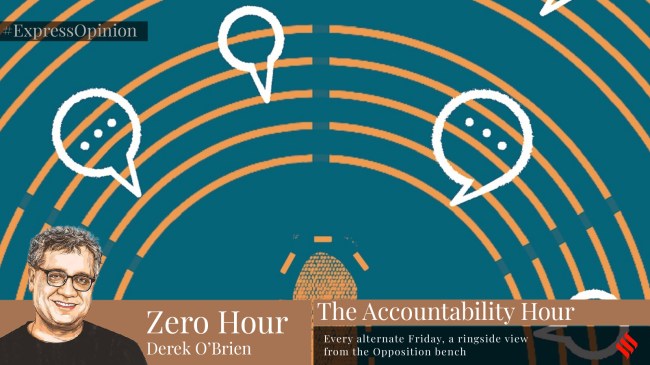Opinion Ten questions during Question Hour — and what the government’s responses reveal
Convictions by the ED, dues under MGNREGS, sickle cell anaemia — areas where MPs sought accountability in Parliament this year
 Answers to questions asked in Parliament are a veritable goldmine. It’s a pity this wealth of information is often overlooked in parliamentary reportage. (Illustration: C R Sasikumar)
Answers to questions asked in Parliament are a veritable goldmine. It’s a pity this wealth of information is often overlooked in parliamentary reportage. (Illustration: C R Sasikumar)
Question Hour. The 60 minutes every day when Parliament is in session and MPs ask questions that ministers have to answer on the floor of the Lok Sabha and Rajya Sabha. An MP has to put in her question/s in writing weeks in advance. A ballot is held to select the questions. Some that are selected are answered orally on the floor of Parliament (starred questions) and some are balloted to be answered only in writing (unstarred questions). Question Hour serves as a crucial tool to hold the government accountable. Answers to questions asked in Parliament are a veritable goldmine. It’s a pity this wealth of information is often overlooked in parliamentary reportage.
After the 26-day Budget Session, here is a selection of 10 questions raised by MPs in this session:
Convictions by the ED
CPI (M) MP A A Rahim inquired about convictions secured by the Enforcement Directorate. The government’s response admitted that between 2015 and 2025, only two convictions had been obtained out of a total of 193 cases against MPs, MLAs, and political leaders. A conviction rate of just one per cent.
Cess and surcharges
Trinamool Congress MP Abhishek Banerjee and BJP MP Rao Rajendra Singh raised a question regarding the collection of cesses and surcharges. The government admitted that between FY2014 and FY2025, the revenue from cesses currently being levied has increased by a whopping 462 per cent. During the same period, surcharges have seen an even sharper rise of 999 per cent. When combined, the overall increase in collections from all cesses and surcharges stands at 304 per cent.
Sickle cell anaemia
BJP MP Ghanshyam Tiwari asked about the progress made in the effort to tackle sickle cell anaemia. The government’s reply showed that the funds allocated to the Council of Scientific and Industrial Research under its sickle cell anaemia mission were reduced by 60 per cent between FY 2020 and FY 2024.
Eklavya schools
Congress MPs Bachhav Shobha Dinesh, Saptagiri Sankar Ulaka and Anto Antony, CPI (M) MP S Venkatesan and BJP MP Vishnu Dayal Ram all asked the same question regarding the operational status of Eklavya residential schools. These institutions had been established to provide quality education to children belonging to the Scheduled Tribes. The government admitted that one out of every three Eklavya model residential schools is non-functional. Odisha reported the highest number of non-operational schools (61 of 108), followed by Jharkhand (39 of 90), Meghalaya (all 37), Nagaland (19 of 22), and Manipur (18 of 21).
PM CARES for Children
CPI (M) MP V Sivadasan asked about the status of beneficiaries under the PM CARES for Children scheme. The government’s reply noted a steep decline in beneficiaries, from 3,694 in 2021 to just 12 in 2024. This represents a drastic drop to only 0.32 per cent of the beneficiaries compared to 2021.
Railways vacancies
Samajwadi Party MP Anand Bhadauria raised a question regarding vacancies in the Railways, specifically in the category of safety. In response, the government stated that 92,116 vacancies were notified in 2024, with the majority of the posts related to safety. However, the government also admitted that the first stage of recruitment had been completed for less than half of these vacancies. Entrance tests were taking place even when the Budget Session of Parliament was in progress. This indicates that none of the vacancies had been filled, and for more than half, the recruitment process had not even been initiated.
Dues under MGNREGS
Trinamool Congress MP Bapi Haldar asked for information on pending dues under MGNREGS (Mahatma Gandhi National Rural Employment Guarantee Scheme). In its response, the government admitted that more than Rs 25,000 crore was owed to various states and Union Territories. It also acknowledged that funds to West Bengal had been suspended since March 9, 2022. In FY2023, West Bengal, Manipur, Lakshadweep, and the Andaman and Nicobar Islands received no funds under the scheme.
Aadhaar-based payments
Congress MP Prashant Yadaorao Padole raised a question regarding the eligibility of MGNREGS workers under the Aadhaar Payment Bridge System (APBS). The APBS uses Aadhaar numbers to directly transfer the wages of MGNREGS workers into their Aadhaar-linked bank accounts. In its response, the government admitted that nearly 30 per cent of all MGNREGS workers were not eligible for payments through the APBS.
Cyber crime prevention
DMK MP Kanimozhi Karunanidhi raised a question regarding the Union government’s Cyber Crime Prevention Against Women and Children scheme. Under this scheme, the Union provides financial assistance to states and UTs for capacity building, such as setting up cyber forensic-cum-training laboratories, hiring junior cyber consultants, and training law enforcement personnel, public prosecutors, and judicial officers. In its response, the government admitted that although the scheme was initiated in 2017, no funds were disbursed to any state in FY 2018. In FY 2023, 20 states and UTs received zero financial assistance under the scheme.
Jan Dhan accounts
Congress MP Pradyut Bordoloi raised a question about zero-balance and non-operational Jan Dhan accounts. In response, the government disclosed that over one in five Jan Dhan accounts are inactive, and eight per cent of all accounts have no funds at all.
The writer is MP and leader, All India Trinamool Congress Parliamentary Party (Rajya Sabha).
Additional research: Dheemunt Jain





